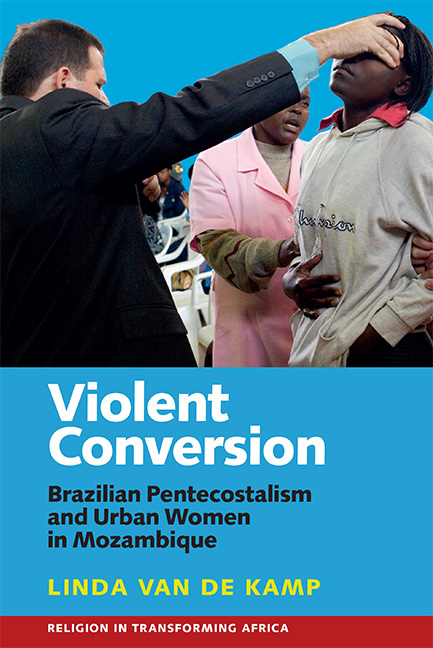Book contents
- Frontmatter
- Contents
- List of Illustrations
- Acknowledgements
- Introduction
- 1 Gender, Family and Social Transformations in Maputo
- 2 Transnational Spaces of Conquest
- 3 Moving Frontiers: the Generational Trajectories of Pentecostal Women
- 4 Converting the Spirit Spouse
- 5 Terapia Do Amor: Confrontational Public Love
- 6 ‘Holy Bonfires’ and Campaigns
- Conclusion: Violent Conversion
- Bibliography
- Index
6 - ‘Holy Bonfires’ and Campaigns
Published online by Cambridge University Press: 24 October 2017
- Frontmatter
- Contents
- List of Illustrations
- Acknowledgements
- Introduction
- 1 Gender, Family and Social Transformations in Maputo
- 2 Transnational Spaces of Conquest
- 3 Moving Frontiers: the Generational Trajectories of Pentecostal Women
- 4 Converting the Spirit Spouse
- 5 Terapia Do Amor: Confrontational Public Love
- 6 ‘Holy Bonfires’ and Campaigns
- Conclusion: Violent Conversion
- Bibliography
- Index
Summary
Biannually, the Universal Church organises a huge campaign called the Fogueira Santa de Israel (Holy Bonfire of Israel or Fogueira for short), during which members sacrifice (sacrificar) large sums of money in order to reach a specific goal. As a ‘test of faith’, participants are urged to ‘give their best’, i.e. as much as they can and even more. During the Fogueira in which I participated in November and December 2005, a sanctuary was built on the podium of every branch of the Church in the city. It resembled the holiest place in the Jewish temple, as described in the Bible's Old Testament. Only priests were allowed to go there under special conditions to sacrifice an animal as an offering for redemption. A ladder to heaven was placed in the sanctuary, similar to the Old Testament's story in the book of Genesis about the ladder in Jacob's dream, which reached from earth to heaven. While angels ascended and descended the ladder, God promised Jacob that through his seed all the families on earth would be blessed.
In the preceding weeks, the Fogueira had already been promoted during services as a life-changing event. All men of God in the Old Testament had been presented several times: Abraham became a father at 100 years of age, Moses performed extraordinary miracles, David defeated the giant Goliath and Jacob became incredibly prosperous. Similarly, God's faithful followers today would be big business women, overseers of large companies, owners of luxurious houses and happily married couples. ‘What is the secret?’ the pastor asked at the launch of the Fogueira in one of Maputo's church branches. ‘These men of God were serious, determined and acted! They did holocaustos [burnt offerings]. Abraham sacrificed his only son. He gave his best.’ At the end of his talk, the pastor asked who wanted to ‘overcome’ poverty and ‘revolt’ against it. ‘Lift up your hand.’ Everyone present did so. The only way, the pastor continued, is ‘to give your best to God. Who is going to sacrifice US$20,000?’ I did not think anybody would come forward, as this was an incredible amount of money even for the most prosperous business people in the audience. But one woman accepted. The pastor exchanged a few words with her, probably to be sure of her determination and willingness to participate (see also van Wyk 2014: 187).
- Type
- Chapter
- Information
- Violent ConversionBrazilian Pentecostalism and Urban Women in Mozambique, pp. 165 - 186Publisher: Boydell & BrewerPrint publication year: 2016

